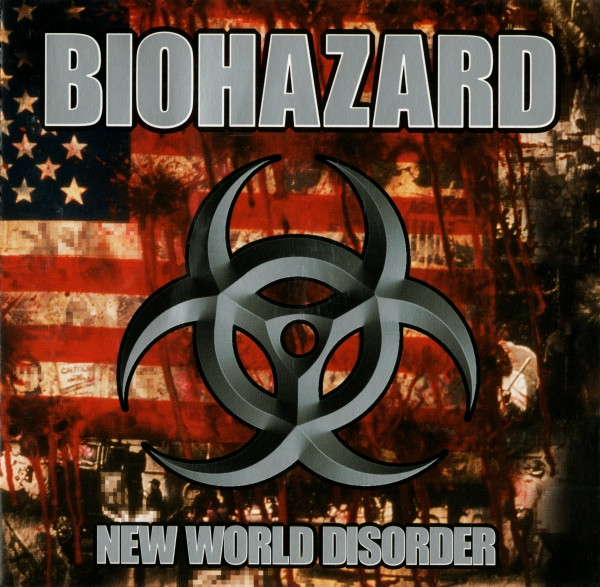Liberal and progressive politics aren’t necessarily widespread or common in heavy metal music. There are exceptions and many bands involved in the genre have long stood against social injustice generally (perhaps a staple of all outsider cultures), but metal bands exhibiting explicitly liberal politics still represent a minority undercurrent. Similarly, hardcore music is also occasionally conservative in its approach—at least in terms of gender equity and standards of masculinity—though there are also recent exceptions to that rule, as well.
So it was refreshing when the band Biohazard released a politically themed record in 1999. Long associated with the New York Hardcore scene and bands such as Agnostic Front, the Cro-Mags, and Mucky Pup, the band’s early days were marred by reviewers interpreting lyrics on their demo as fascist and white supremacist; the band had to address challenges of racism. (Members Danny Schuler and Evan Seinfeld are Jewish, and Seinfeld—Jerry Seinfeld’s second cousin—has an abdomen tattoo of the Star of David.)
I consider Biohazard primarily a metal band, though there are elements of hardcore present—mostly in the vocal presentation—and rap in the music created by Rob Echeverria (lead guitars), Billy Garziadei (guitars and vocals), Schuler (drums), and Seinfeld (bass and vocals). Def Jam rapper Sticky Fingaz contributes to the title song, the last on the album, reminiscent of Public Enemy’s work with Anthrax. In some ways, Biohazard was a precursor to later nu metal bands even as it avoided clear-cut crossover status (in the Dirty Rotten Imbeciles sense) itself or the purely progressive politics of Rage Against the Machine.
New World Disorder, the band’s sixth album—and third on a major label—reflects a slightly more open-minded approach to personal and community politics than I tend to expect from metal bands. The record continues to address themes raised on earlier albums such as Urban Discipline (which included a Bad Religion cover) and State of the World Address (which Entertainment Weekly indicated as containing “modern-day protest songs”). Regardless, by the end of this album, despite calls for independence and solidarity—standard hardcore themes—I’m left feeling as though the band might perhaps be more interested in conspiracy theories than community development.
Song topics include independence and individuality, opting out of careerism and commercial competition, self-improvement and equality, loneliness and frustration, unity and betrayal, integrity and introspection, change, dishonesty, the democratic process, hurt, war, and the state of the world.
After several assertive songs kicking off the album, the band turns to a slower, softer tune, “End of My Rope,” which features James Hetfield-like Metallica-style singing and some Danzig-esque sensibilities at the end. The song addresses suicidal ideation. “Skin” is an excellent song, a standout, focusing on change and loss. Later in the record, “Cycle of Abuse” also offers more tuneful singing—effectively leavening Biohazard’s drop D shout-along metal. There are a couple of sound art pieces or audio collages at the end of the record, preceding “Dogs of War” and “New World Disorder,” the most explicitly political songs on the record. That last song also features Sticky Fingaz, as well as Christian Olde Wolbers (then of Fear Factory) and Igor Cavalera (then of Sepultura).
In addition to the title track’s international (Belgium and Brazil) and racial inclusion—and lyrics such as “fuck Skull and Bones and Illuminati”—the song also includes someone shouting “behold a pale horse” multiple times in the background. That is likely a reference to the 1991 book by William Milton Cooper, a conspiracy theorist and radio broadcaster who was shot by police during an attempted arrest. Embraced by largely right-leaning militia members as well as anti-government activists, the writings of Cooper can be read as anti-Semitic.
In any event, as a whole, the album is largely positive in its politics regardless of the darkness of its themes and lack of political clarity. After the record was released, the band returned to independent labels, disbanding briefly in 2006. The band would return two years later, only to have Seinfeld leave in 2011.
Along the way, he turned his attention to acting. Seinfeld joined the cast of prison television drama Oz as biker gang leader Jaz Hoyt, first appearing in a second season episode aired by HBO in 1998. He was on the program for five seasons, with Seinfeld’s final episode as a character airing in 2003. Seinfeld also became an adult performer using the name Spyder Jonez appearing in—and directing—pornographic movies in 2004. Adult Film Database reports almost 50 porn releases featuring Seinfeld’s work between 2004 and 2012, mostly with his own studio but also with Burning Angel and Vivid.
Seinfeld married porn actress Tera Patrick in 2004, divorcing in 2011 before marrying former porn actress Lupe Fuentes, to divorce a couple of years ago. With Patrick, he built the adult studio Teravision and its sub-brand Iron Cross Entertainment, which dealt in slightly rougher trade. Additionally, Seinfeld has had a hand in the adult entertainment businesses Peepstar and IsMyGirl (part of Santa Monica-based Cre8 Media with Fuentes), also partnering with Streamate for another Web project. Seinfeld has also launched a community-based coaching service for men called Mantorship.
While I applaud Seinfeld’s individualism and wide-ranging career—he's definitely making his own way—his work in porn doesn’t help clarify the politics of Biohazard. Maybe the politics weren’t the point.





No comments:
Post a Comment